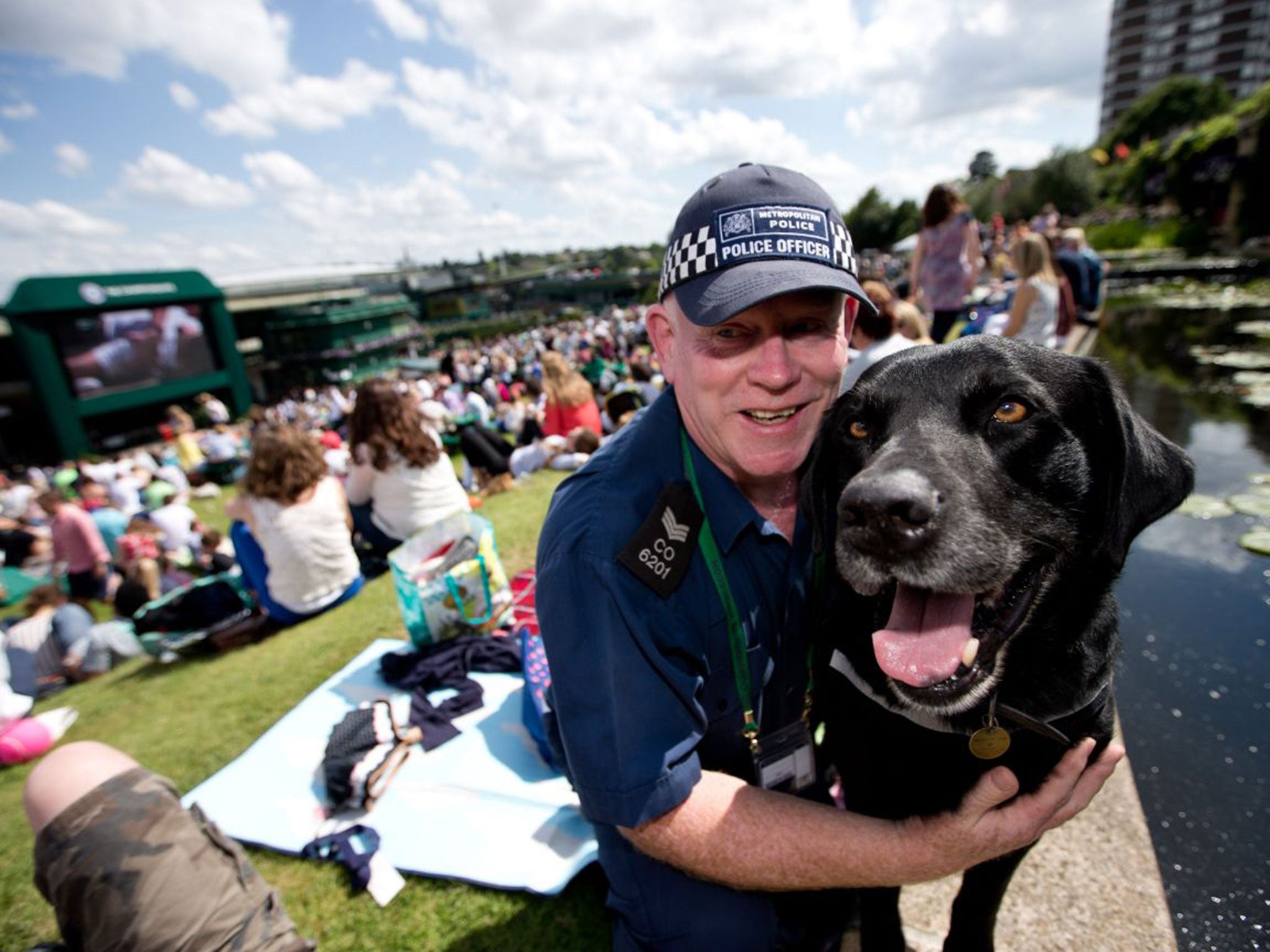Wimbledon 2014: Dylan the bomb-sniffing labrador bows out after eight years
He's one of the longest-serving police dogs at Wimbledon, and has 27 offspring in the family trade

Your support helps us to tell the story
From reproductive rights to climate change to Big Tech, The Independent is on the ground when the story is developing. Whether it's investigating the financials of Elon Musk's pro-Trump PAC or producing our latest documentary, 'The A Word', which shines a light on the American women fighting for reproductive rights, we know how important it is to parse out the facts from the messaging.
At such a critical moment in US history, we need reporters on the ground. Your donation allows us to keep sending journalists to speak to both sides of the story.
The Independent is trusted by Americans across the entire political spectrum. And unlike many other quality news outlets, we choose not to lock Americans out of our reporting and analysis with paywalls. We believe quality journalism should be available to everyone, paid for by those who can afford it.
Your support makes all the difference.Rufus the hawk, the scourge of the Wimbledon pigeon population, is a familiar sight in the skies around SW19. But for the past eight years the Championships has also relied upon the services of another lesser-known animal whose work is far more important to its success.
His name is Dylan, a black labrador who sniffs out bombs. One of the longest-serving police dogs in the history of the tournament – and the most fertile, with no fewer than 27 offspring to his name – he finally retired today after eight consecutive Championships.
Bred by Scotland Yard's Explosives Search Dogs unit, which is used by Buckingham Palace, the House of Commons and other high security sites in London to detect potentially lethal devices, since the age of 10 months he has barely left the sight of his handler Sergeant Martin Proctor, a softly-spoken Welshman who also retired today at the age of 54.
“He’s always been a police dog,” Sgt Proctor told The Independent, as Dylan sat docile at his feet during a break in his shift. “I got him at about 10 months old, and was told he probably wouldn’t make it because they didn’t think he was good enough. But he proved them all wrong and he’s actually been exceptional – he’s very, very good at what he does.”
Like Rufus, Dylan’s day begins in the early hours of the morning, but his work is far less ostentatious. He and Sgt Proctor – the only police officer permitted to work with him – scout the rooms and corridors of the All England Club sniffing out danger well before the gates open and the crowds arrive. Dylan finds it difficult to work while spectators lavish him with attention, but there are also other distractions around the grounds.
“A lot of the labradors you’ll see working here are his offspring,” says Sgt Proctor. “That’s why he smiles a lot, because he’s got 27 kids out there somewhere. Not all of them are based here at the same time; a lot of them are customs dogs now, but he’s certainly been quite successful.”
Dylan is also popular among the players, many of whom recognise him immediately and have given him signed balls to play with while off-duty. “The ones who make the biggest fuss are those from abroad who’ve got dogs and miss them because they’ve left them at home,” says Sgt Proctor.
The pair are retiring at the end of the first week rather than the second due to Sgt Proctor’s notice period, which runs out at the end of June. “I wanted specifically to do Wimbledon – this is probably our favourite event, so it’s a nice one to finish on. It’s my favourite place to work,” he says.
“Effectively, I spend more time with him than my family, because I work with him and he comes home with me as well. We’ve spent a lot of time together – that’s why our bond is unique. I put a lot of faith in this guy, a lot of trust, because of what he’s searching for.”
Sgt Proctor is not allowed to say exactly how many police dogs work at Wimbledon or go into the details of their shift patterns for security reasons, but he says there are “quite a few” spaniels and labradors in service around the grounds. None of them, however, are searching for drugs – this is Wimbledon, after all.
Join our commenting forum
Join thought-provoking conversations, follow other Independent readers and see their replies
Comments